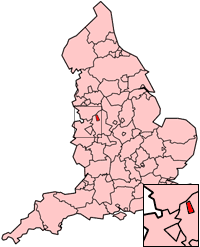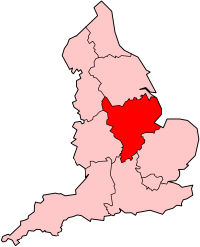
Worcestershire is a ceremonial county in the West Midlands of England. It is bordered by Shropshire, Staffordshire, and the West Midlands county to the north, Warwickshire to the east, Gloucestershire to the south, and Herefordshire to the west. The city of Worcester is the largest settlement and the county town.

Staffordshire is a landlocked ceremonial county in the West Midlands of England. It borders Cheshire to the north-west, Derbyshire to the east, Warwickshire to the south-east, the West Midlands county and Worcestershire to the south, and Shropshire to the west. The largest settlement is the city of Stoke-on-Trent; the county town is Stafford.

The Midlands is the central part of England, bordered by Wales, Northern England, Southern England and the North Sea. The Midlands were important in the Industrial Revolution of the 18th and 19th centuries and are split into the West Midlands and East Midlands. The biggest city, Birmingham, is the second-largest in the United Kingdom. Other important cities include Coventry, Derby, Leicester, Lincoln, Nottingham, Stoke-on-Trent, Wolverhampton, and Worcester.
The Brummie dialect, or more formally the Birmingham dialect, is spoken by many people in Birmingham, England, and some of its surrounding area. "Brummie" is also a demonym for people from Birmingham. It is often erroneously used in referring to all accents of the West Midlands, as it is markedly distinct from the traditional accent of the adjacent Black Country, but modern-day population mobility has tended to blur the distinction. Population mobility has meant that to a degree, the Brummie accent extends into some parts of the Metropolitan Borough of Solihull, but much of the accent within the borough might be considered to be closer to contemporary Received Pronunciation (RP).

The West Midlands is one of nine official regions of England at the first level of International Territorial Level for statistical purposes. It covers the western half of the area traditionally known as the Midlands. The region consists of the counties of Herefordshire, Shropshire, Staffordshire, Warwickshire, West Midlands and Worcestershire. The region has seven cities; Birmingham, Coventry, Hereford, Lichfield, Stoke-on-Trent, Wolverhampton and Worcester.

Hereford and Worcester was an English non-metropolitan county created on 1 April 1974 by the Local Government Act 1972 from the areas of the former administrative county of Herefordshire, most of Worcestershire and the county borough of Worcester. An aim of the Act was to increase efficiency of local government: the two counties are among England's smaller and less populous counties, particularly after the same Act transferred some of Worcestershire's most urbanised areas to the West Midlands.

Free Radio Herefordshire & Worcestershire is an Independent Local Radio station owned and operated by Bauer as part of the Hits Radio network. It broadcasts to Herefordshire and Worcestershire.

Metropolitan and non-metropolitan counties are one of the four levels of subdivisions of England used for the purposes of local government outside Greater London and the Isles of Scilly. As originally constituted, the metropolitan and non-metropolitan counties each consisted of multiple districts, had a county council and were also the counties for the purposes of Lieutenancies. Later changes in legislation during the 1980s and 1990s have resulted in counties with no county council and 'unitary authority' counties with no districts. Counties for the purposes of Lieutenancies are now defined separately, based on the metropolitan and non-metropolitan counties.

Potteries is an English dialect of the West Midlands of England, almost exclusively in and around Stoke-on-Trent, Staffordshire.

East Midlands English is a dialect, including local and social variations spoken in most parts of East Midlands England. It generally includes areas east of Watling Street, north of an isogloss separating it from variants of Southern English and East Anglian English, and south of another separating it from Northern English dialects. This includes the counties of Derbyshire, Leicestershire, Lincolnshire, Nottinghamshire, Rutland and Northamptonshire. Dialects of northern Derbyshire, Nottinghamshire and Lincolnshire usually share similarities with Northern English dialects. Relative to other English dialects, there have been relatively few studies of East Midlands English.

The West Midlands Ambulance Service University NHS Foundation Trust (WMAS) is responsible for providing NHS ambulance services within the West Midlands region of England. It is one of ten ambulance trusts providing England with emergency medical services, and is part of the National Health Service.

The Hereford and Worcester Fire and Rescue Service (HWFRS) is the statutory fire and rescue service covering Herefordshire and Worcestershire in the West Midlands region of England. The service covers an area of 1,514 square miles (3,920 km2), and a population of around 780,000 people.
NHS West Midlands was a strategic health authority (SHA) of the National Health Service in England. It operated in the West Midlands region, which is coterminous with the local government office region. It was abolished in April 2013.
The English language spoken and written in England encompasses a diverse range of accents and dialects. The language forms part of the broader British English, along with other varieties in the United Kingdom. Terms used to refer to the English language spoken and written in England include English English and Anglo-English.

Scouting in West Midlands provides an overview of Scouting activities in the governmental region of the West Midlands. The largest number of Scouts and volunteer leaders in the region is linked to the Scout Association of the United Kingdom, while there is also a presence of traditional Scouting groups, such as the Baden-Powell Scouts' Association. The Scout Association administers the region through 8 Scout Counties, overseen by a regional commissioner, which follow the boundaries of the ceremonial counties they exist within. There are also a number of Scouting clubs within Universities in the region which are affiliated to the Student Scout and Guide Organisation.
Midlands 4 West (South) is a level 9 English Rugby Union league and level 4 of the Midlands League, made up of teams from the southern part of the West Midlands region including clubs from parts of Birmingham and the West Midlands, Herefordshire, Warwickshire, Worcestershire and even on occasion Oxfordshire, with home and away matches played throughout the season. Each year some of the clubs in this division also take part in the RFU Junior Vase - a level 9-12 national competition.

The administrative boundaries of Worcestershire, England have been fluid for over 150 years since the first major changes in 1844. There were many detached parts of Worcestershire in the surrounding counties, and conversely there were islands of other counties within Worcestershire. The 1844 Counties Act began the process of eliminating these, but the process was not completed until 1966, when Dudley was absorbed into Staffordshire.
The Black Country dialect is spoken by many people in the Black Country, a region covering most of the four Metropolitan Boroughs of Dudley, Sandwell, Walsall and Wolverhampton. The traditional dialect preserves many archaic traits of Early Modern English and even Middle English and may be unintelligible for outsiders. This dialect is distinct from and maintains more traditional characteristics than the dialect of Birmingham, which has been more influenced by standard English due to having been urban for a longer time. It has also influenced the accents of the towns and villages in the counties to the north, south and west of the region.
The North Midlands Rugby Football Union is a governing body for rugby union in part of The Midlands, England. The union is the constituent body of the Rugby Football Union for the counties of Herefordshire, Shropshire, Worcestershire and the Greater Birmingham area.













